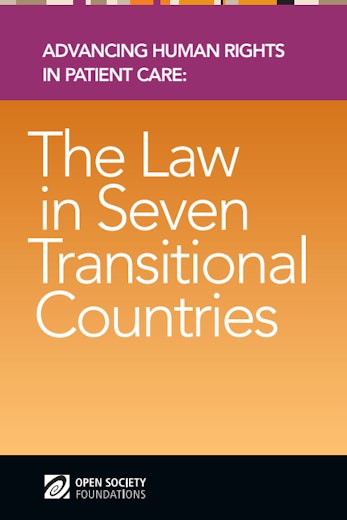Making Laws Work for Patients
By Tamar Ezer
- A Roma woman is relegated to a segregated, inferior maternity ward.
- A man with mental disabilities is locked up, forcibly medicated, and held in unhygienic conditions.
- Hospital staff publicly disclose a patient’s HIV status.
- A drug user is denied anesthesia during a medical operation.
- A health care facility refuses to treat a sex worker, throwing her out with a gaping wound.
- Roma women, women living with HIV, women with disabilities, and transgender persons are sterilized without their consent.
As we commemorate the seventh annual European Patients’ Rights Day, we acknowledge that health care violations like these are still widespread in many Eastern European and Central Asian countries. This is especially true for marginalized people like Roma, people with disabilities, people living with HIV, people who use drugs, sex workers, and transgender persons, who often experience health care settings as places of punishment, coercion, and violence—rather than treatment and care.
At the same time, in the transition from communism—and with an eye to EU accession—many countries in this region have engaged in extensive legal reforms and passed laws to protect rights. But these laws are rarely enforced, and they remain largely unknown by lawyers, health care providers, and patients.
To help these laws work for patients, Open Society has produced a series of practical how-to manuals—Practitioner Guides—for lawyers to address human rights violations in patient care. The series examines legal mechanisms in ten countries: Armenia, Georgia, Kazakhstan, Kyrgyzstan, Macedonia, Moldova, Serbia, Romania, Russia, and Ukraine (four of these guides are forthcoming). At national, regional, and international levels, the guides examine patient and provider rights and responsibilities, as well as procedures for protection through both the formal court system and alternative mechanisms.
The Practitioner Guides draw on the concept of “human rights in patient care,” or the application of human rights principles to all stakeholders in the delivery of health care. This recognizes the interrelation between patient and provider rights, and government responsibility to address systemic issues. Providers are unable to provide high quality care unless their rights are also respected, and they can work under decent conditions with professional independence.
This series is the first to systematically examine the application of constitutional, civil, and criminal law, categorize them by right, and provide examples and practical tips. It has been embraced not just by lawyers, judges, and NGOs, but by health care providers interested in respecting legal protections and incorporating human rights norms in their work.
The Practitioner Guides have been used to:
- Support lawyers in bringing human rights in patient care claims, increasing accountability
- Equip public defenders to take on more cases related to patients’ rights violations
- Support judges in deciding human rights in patient care cases
- Motivate health care providers to raise concerns with administrative bodies
- Empower socially marginalized patients, such as people living with HIV or Hepatitis C, to defend their rights
- Integrate legal support into programs for people living with HIV and the LGBT community
- Drive reform by highlighting gaps in national legislation and mobilizing stakeholders to address them
- Provide a framework for contributions to shadow reports to international human rights bodies, highlighting health and human rights concerns
- Enable NGOs to integrate human rights in patient care advocacy in their work
- Support recent law graduates to work at the intersection of health and human rights
- Integrate human rights in patient care issues into medical, law, and public health courses
- Help form health and human rights advocacy networks
On this European Patients’ Rights Day, we must remember that the exercise and protection of rights require accountability and enforcement. We offer the Practitioner Guides as a strong tool to that end.
Until June 2016, Tamar Ezer was deputy director of the Law and Health Initiative of the Open Society Public Health Program.

